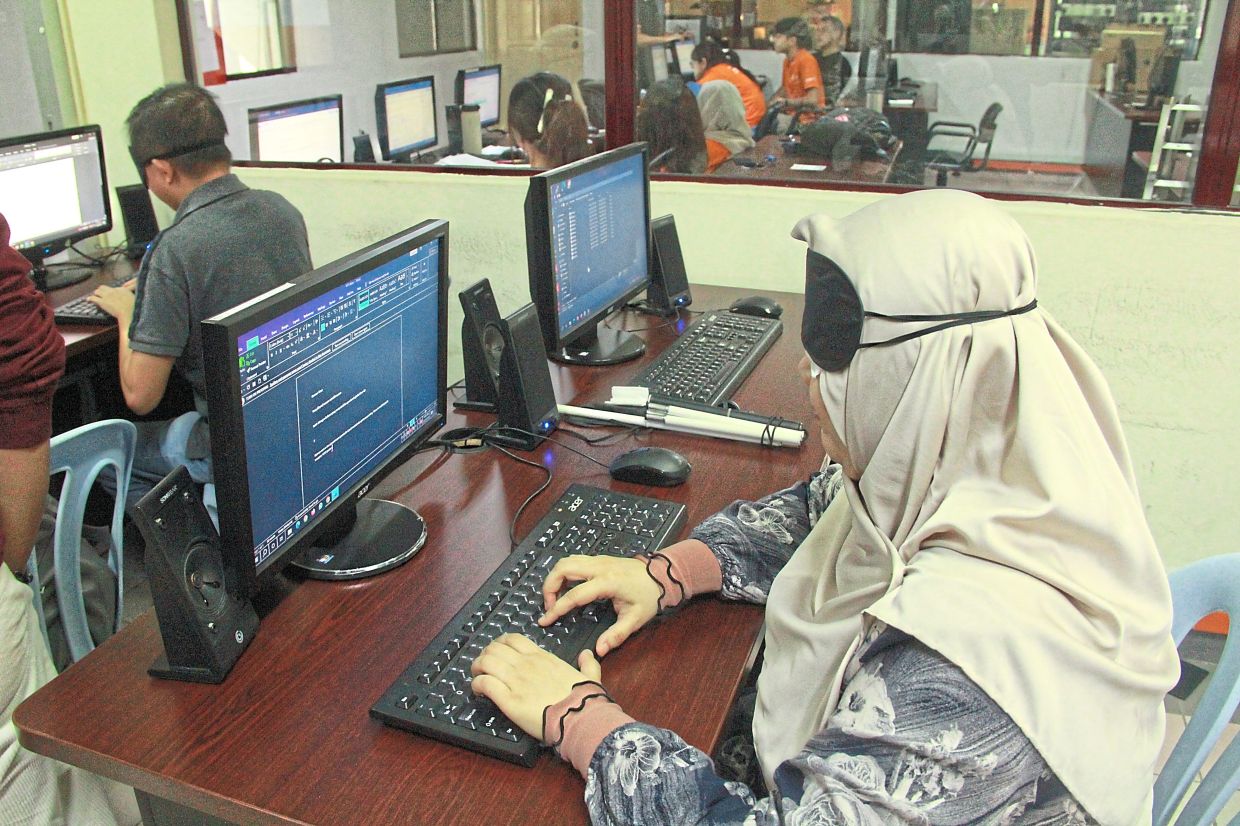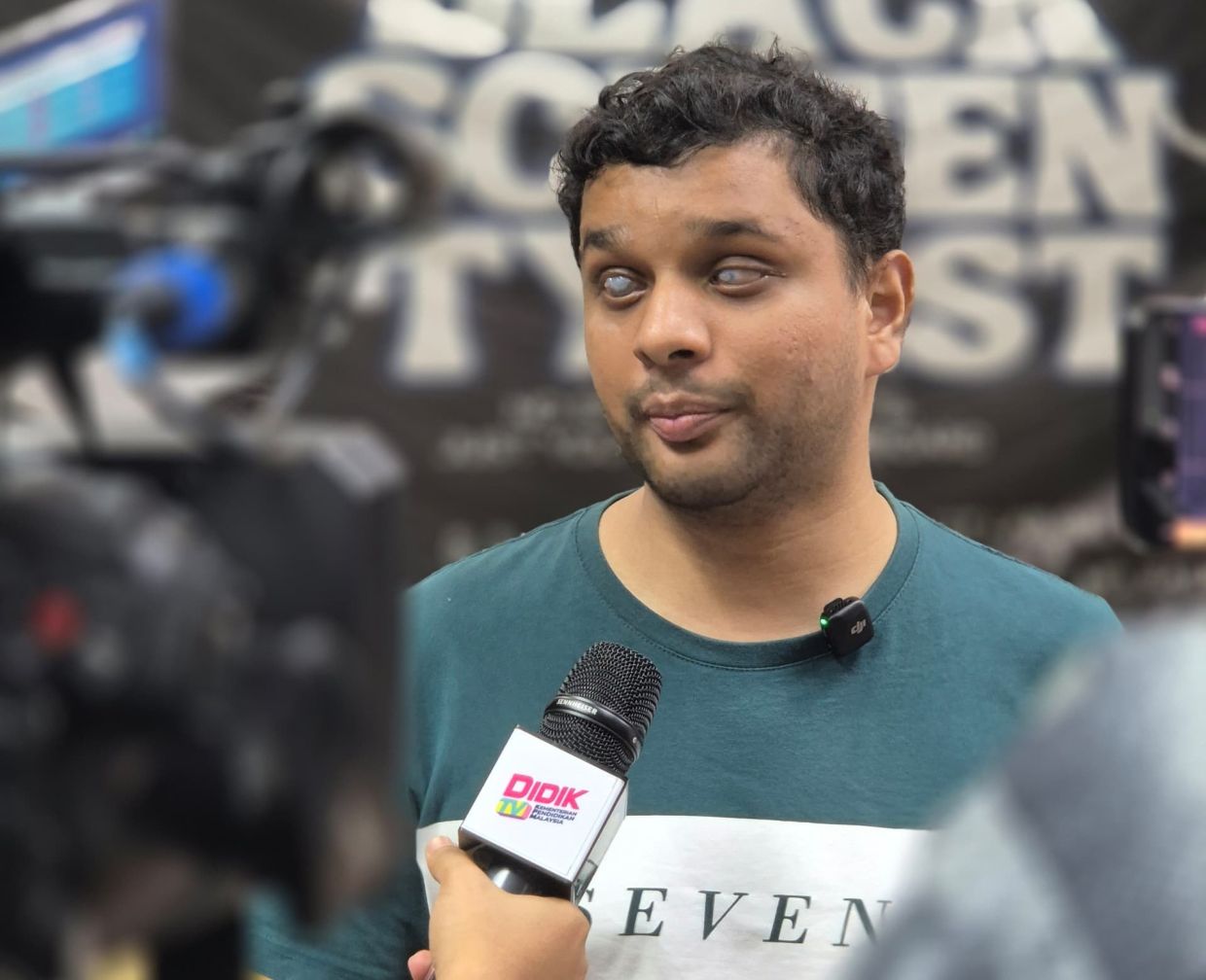‘I joined these competitions to challenge myself, improve my skills, and gain more experience,’ says Rishan. Photos: Kanithra Naidu
When Rishan Ponraj Sivaraj, 23, heard about the Malaysian Association for the Blind’s (MAB) first-ever typing contest for visually-impaired folks, he decided to put his typing skills to the test.
Rishan, a bank management trainee, never expected that he would beat the other participants and emerge as the winner of the Black Screen Typist Competition (BSTC).
“I joined the competition out of interest – I wanted to try something new and challenge myself. Honestly, I’d rate my typing skills around six or seven out of 10. I am fairly skilled, but I knew there was still room for improvement.
“There were many participants, and most were older and more experienced. So, it was a real surprise to find out I had actually won the competition,” says Rishan during a phone interview from Dengkil, Selangor.
Held on July 4 at the MAB complex in Brickfields, Kuala Lumpur, the competition featured two categories: Bahasa Malaysia and English. Rishan clinched first place in the Bahasa Malaysia category and walked away with a RM1,000 cash prize.
Born with cataracts and glaucoma, Rishan can see some light, reflections and colours, especially if they are close to him. Despite his visual challenges, he completed his Form Six with an impressive 3.58 CGPA and went on to obtain a Bachelor of Arts (English for Professionals) degree from Universiti Sains Malaysia, Penang.
Since January last year, Rishan has been working at a bank in KL.
The youngest of four siblings, Rishan is no stranger to typing competitions. He has taken part in local Braille reading contests organised by the Society of the Blind Malaysia and MAB.
In 2020, he won the first prize (junior category) at the 7th International Braille Reading and Writing Competition in Bangkok, Thailand.
“I joined these competitions to challenge myself, improve my skills and gain more experience.
“Winning the international event made me especially happy because I got to represent Malaysia with pride. It was also a wonderful opportunity to meet participants from other countries and learn from them.”
Winning touch
The BSTC attracted 23 visually impaired participants, mainly from the Klang Valley.
To qualify, participants needed to have an OKU (Orang Kurang Upaya) card and be familiar with computers running on the Windows operating system, including navigating File Explorer, and using Microsoft Word and screen reader software such as Non-Visual Desktop Access (NVDA) or Job Access With Speech (JAWS).
Intermediate-level typing skills were required.
During the contest, participants were blindfolded and tasked with typing along to a pre-recorded audio using NVDA. Scores were based on speed and accuracy.
Rishan scored an impressive 92.5%.
MAB’s information and communications technology senior executive Haffiyan Lali, 35, who is blind himself, says the competition seeks to challenge misconceptions about the blind in today’s digital age.
“Many people are still unaware that visually impaired individuals can be just as productive as everyone else, provided they are given the right equipment and environment.
“We hope the competition highlights the importance of digital accessibility. We also want to show the public that the blind are just as capable and deserving of equal opportunities.
“The visually impaired can be just as productive as anyone else,” says Haffiyan.
He also hopes participants will walk away with a sense of empowerment and confidence.
Haffiyan says: “For many, this could have been their first time showcasing their digital skills in a public setting, and we want them to feel proud of their abilities.
“We also hope they gain a deeper sense of community, knowing they are not alone, and that there are others like them pushing boundaries and breaking stereotypes.
“This competition was also a chance for participants to build self-belief, develop soft skills like focus and resilience, and be inspired to keep pursuing opportunities in education, employment and beyond. We want them to know that their skills matter, their voices are heard, and their contributions are valuable.”
Through the competition, Haffiyan also hopes the public will realise that life without sight doesn’t mean life without capability.
“Blind and visually-impaired individuals are just as intelligent, skilled and productive as anyone else, especially when accessibility is prioritised.
“Ultimately, this is about shifting perspectives, from seeing disability as a limitation to understanding it as a part of human diversity that deserves equal opportunity and support.”
Rishan is living proof of all that.
“I told myself that God created me this way for a reason, so no matter what, I have to go on with my life. This mindset helped me accept my situation. Being blind made me see life from a different point of view, and I feel thankful because of that.
“For others who might be struggling, my advice is to accept yourself fully, lean on your family and friends for support, and believe in your own abilities.
“Focus on what you can do instead of what you can’t. Life might be different, but it is still beautiful. Keep learning, stay hopeful, and be grateful for your own journey,” he concludes.
Keys to success
‘I joined these competitions to challenge myself, improve my skills, and gain more experience,’ says Rishan. Photos: Kanithra Naidu
The competition highlighted the importance of accessibility and showed that the blind are ready for equal opportunities.
Photo: Kanithra Naidu






